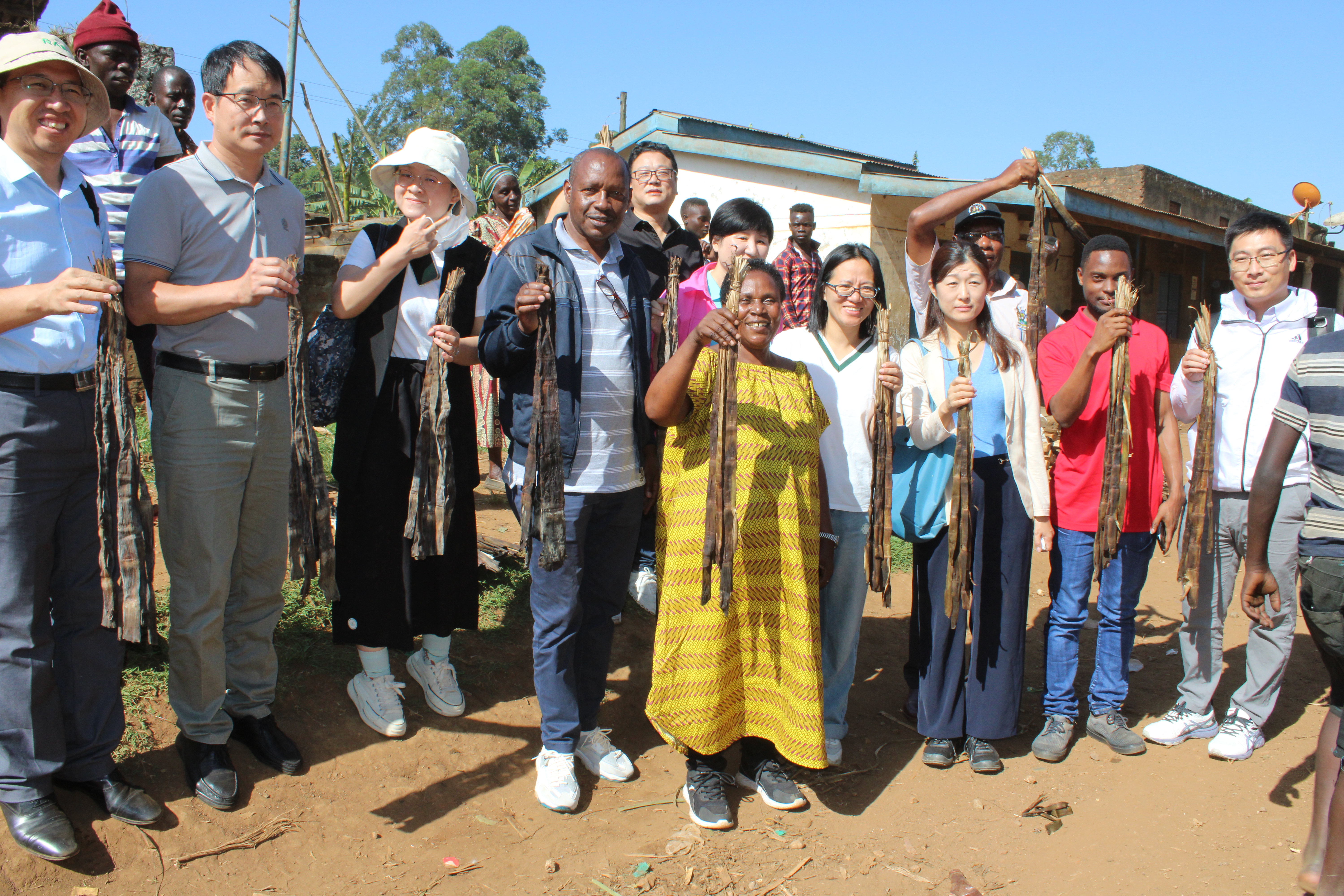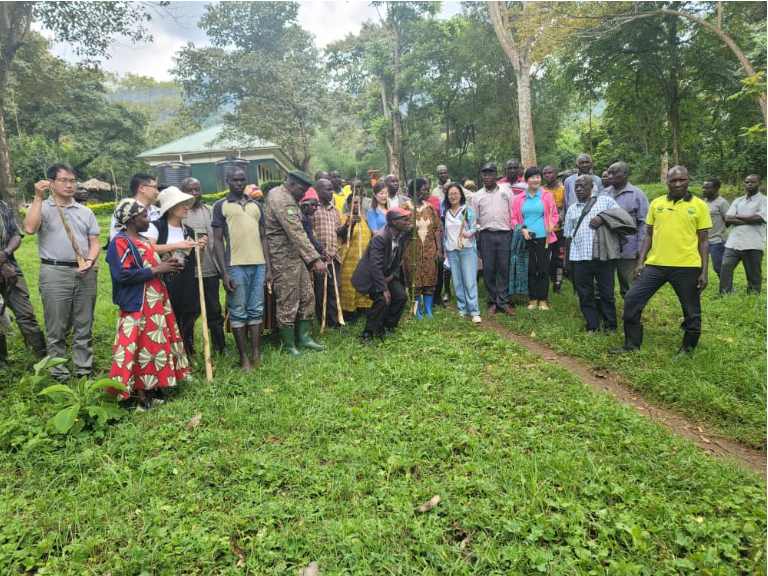THE STORY OF MOUNT ELGON’S COMMUNITY
As narrated by Irene Wabule Walimbwa, Founder and CEO, AW Bamboo Enterprises Ltd.
Mount Elgon, on the border of eastern Uganda and western Kenya, is the oldest extinct volcano in East Africa. Its slopes were once covered with dense montane forest, with belts of lush highland bamboo (Yushania alpina). Over time, overuse by local people who struggle to feed their families and meet livelihood needs has depleted the forest cover. This makes the mountain slopes highly vulnerable to weather-related hazards. In 2010, a landslide following heavy rains killed more than 300 people in Bududa District on the Ugandan slopes of Mount Elgon, sweeping away several villages, schools, and health centers – a disaster that shook the world. Another landslide in the region in 2018 killed 40 people.
Deforestation has also caused tensions between the Uganda Wildlife Authority (UWA), which runs the Mount Elgon National Park for nature conservation and tourism, and the local communities, who want continued access to timber and non-timber forest products.
Irene Walimbwa was a local advocate and champion of women and youth empowerment when, in 2002, she mobilized a group of vulnerable women and young farmers to start a savings association for small business support. Early successes focused on livestock husbandry, but this work soon led to the idea of starting a company to process bamboo products to ease these local tensions and advance sustainable development in the Mount Elgon region.
Irene knew that bamboo had the potential to provide multidimensional benefits to local people and the ecosystem, stabilizing the mountain slopes to prevent landslides while contributing to local economic empowerment and disaster risk reduction:
The tree planting would help to stabilize soils on the mountain slopes and reduce the risk of erosion and landslides that have plagued the region in the past.
The shoots – both fresh and dried, whole and powdered – are a highly prized delicacy of the region with great market potential. The enterprise could provide decent jobs, especially for women and young people in the community, along the entire value chain – tree planting, cultivation, sustainable harvesting of bamboo shoots, processing, packaging, and marketing a range of consumer products.
It would help to reduce conflicts around natural resource use between community members and the UWA by delineating and permitting economic activities in a specific area of parkland.
Generating carbon credits would create a further revenue stream for the community by enhancing a natural carbon sink.

Irene registered AW Bamboo Enterprises Limited in 2012 to enable local communities to grow bamboo on a large scale and to conserve, add value, and distribute bamboo products to low-income and environmentally vulnerable communities in the Mount Elgon region. Although her goals were clear, there was little or no dedicated land available for the enterprise to access for cultivation, so the bamboo had to be sourced from traders.
Irene was highly resourceful in networking and raising funds and in-kind support from diverse sources for the venture. She joined the Uganda Small Scale Industries Association where she networked with other local businesses. At a 2018 trade show, she met with representatives of the Uganda Development Corporation. The corporation invited her to apply for funds, on condition that the business produces its own bamboo. Irene had the idea of applying to the UWA to use land within the Mount Elgon National Park for bamboo cultivation.
By 2021, Irene had signed a Memorandum of Understanding with the UWA and the Bududa District government, giving AW Bamboo Enterprises the right to use land within the national park for sustainable cultivation and livelihood activities. AW Bamboo Enterprises launched a pilot project to work with communities in the district.5 More than 500 women and young people from the local communities are now involved, growing Highland bamboo and other species such as Arabica coffee, Olea welwitschia (Elgon teak), Podocarpus spp., Prunus africana, mahogany spp., Aningeria altissima, Cordia africana (Sudan teak), Cordia millenii, Strombozia schefulleri, Syzygium spp., and Newtonia buchananii.
The bamboo saplings planted in 2021 are bearing shoots, which can now be harvested and packaged. Local people are creating economic value by processing the harvest into diverse products. Bamboo shoots are harvested and either sold fresh locally or dry-smoked, packaged, and sold. The dry-smoked shoots are also ground into powder, used in local cooking, for sale.
In partnership with the International Network of Bamboo and Rattan, training is provided to community members in various activities related to bamboo value addition, post-harvest handling, and financial skills. They are also made more aware of climate change, and the best ways to prepare for its impacts on their society and livelihoods.
As for other tree species, Irene says: “The Mount Elgon National Park has restrictions on logging, so we will distribute the other tree species to farmers,” says Irene. “We will encourage them to address deforestation by growing these other species on the degraded land and use the tree products for their livelihoods.” The community members already obtain immediate benefits from AW Bamboo Enterprise’s MOU with the UWA, because the project allows them to intercrop maize, onions, beans and other vegetables among the bamboo trees, for seasonal harvesting. Without the project, they would have been excluded from this land in the Mount Elgon National Park; now they can farm it in an ecologically sustainable way, while contributing to soil stabilization on the mountain slopes.
AW Bamboo Enterprises shows how community-led ecosystem restoration, linked to indigenous species propagation and growth, can drive business models that are environmentally, socially, and economically sustainable. Local entrepreneurs can create a virtuous circle of added value, while cashing in on local cultural tastes for sustainably produced goods.
How Challenges are Addressed
The key challenges faced by AW Bamboo Enterprises are limited financial resources and access to technology – for instance for packaging. The process of packaging by hand is slow. More capital is needed for the mechanization of parts of the process, which would save workers’ time and enable the business to scale up. The process of training local farmers is also necessarily time-consuming but is being patiently addressed. With sufficient finance, equipment, and training, the possibility of scaling up production to create further, secure livelihoods and access wider markets would be possible.
From this pilot project, the hope is that the ecosystem restoration, sustainable use, and value chain model can be replicated in other districts of the Mount Elgon region. Irene believes that communities may go from strength to strength in fulfilling their livelihood needs and enjoying local produce if they restore key ancient and indigenous tree species in the Mount Elgon region over the next 10–30 years.
